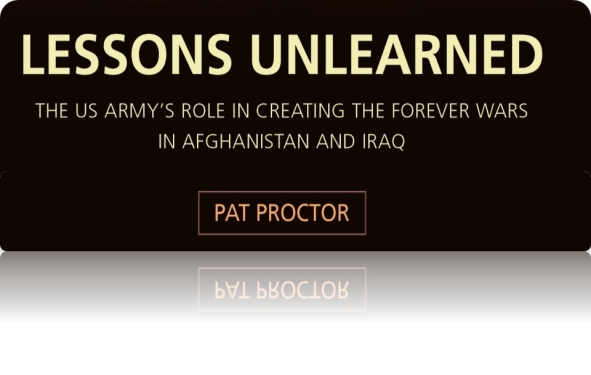“A brutally honest, thought-provoking, and brilliant examination of the
American military’s failure to adapt to post-Cold War realities and understand
the challenges of the post-9/11 world; and a compelling warning against
completely jettisoning hard-won lessons eventually learned in Iraq and
Afghanistan while (understandably) shifting priorities to the potential of
large-scale combat in an era of renewed great power rivalries.”
David Petraeus, General, U.S. Army, Ret., former Commander of the
Surge in Iraq, Coalition Forces in Afghanistan, U.S. Central Command, and
former Director of the CIA
“Having done his homework thoroughly and having deployed widely in Iraq and
Afghanistan, Colonel Pat Proctor has sallied forth to challenge U.S. Army
doctrine. How does an organization prepare and perform to win both an unlikely
major war and the every-day skirmishing called low-intensity conflicts? Proctor
has the courage and intellectual firepower to challenge the status quo and to
prescribe deep, real changes.”
Bing West, co-author with Jim Mattis of Call Sign Chaos:
Learning to Lead
“Colonel (Retired) Pat Proctor has written an extremely thorough study of the
history of the US Army from the fall of the Soviet Union to the present day,
examining how the world's most professional and capable land force has struggled
so mightily to succeed in two counterinsurgency campaigns. His conclusion—that
the Army failed to prepare for the wars in Iraq and Afghanistan despite
considerable evidence that these were the kind of wars it was going to fight in
this century—rings true and is informed by his own experience during so much of
that time period. Highly recommended.”
John Nagl, Headmaster at The Haverford
School, author of Knife Fights: A Memoir of Modern War in Theory and Practice
“Dr. Proctor's critiques of the past are hard-hitting, but even for those of
us who would not go quite so far, his clear-eyed emphasis on the importance of
future stabilization and counterinsurgency missions is compelling in a world
heading soon for 10 billion humans and many dozens of megacities--with enormous
nontraditional threats of great potential consequence to American national
security lurking within.”
Michael O’Hanlon, Senior Fellow at the Brookings Institution, and
author of The Future of Land Warfare
“Will contribute to very important debates about the future of the Army.”
Richard A. Lacquement Jr., United States Army War College, author
of Shaping American Military Capabilities after the Cold War
"Patrick Proctor forcefully argues that while the U.S. Army has repeatedly
demonstrated that it can learn fairly quickly, that is because it tends to
forget even faster. There is a great deal to ponder in these pages for Soldiers
and policy-makers alike, as they wrestle with the missions and structure of the
future American military."
Conrad Crane, author of Cassandra in Oz: Counterinsurgency and
Future War
|
